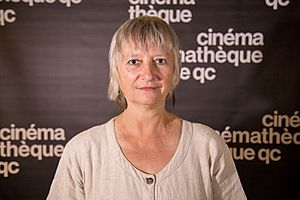Sophie Bissonnette facts for kids
Quick facts for kids
Sophie Bissonnette
|
|
|---|---|
 |
|
| Born | September 18, 1956 |
| Occupation | Filmmaker |
| Known for | A Wives' Tale, L'amour... a quel prix?, Quel Numero? |
Sophie Bissonnette is a Canadian filmmaker. She works as a director, editor, writer, and producer in the film industry in Quebec. After finishing her studies at Queen's University, she started making movies in Montreal.
Most of her documentary films were released in the 1980s. In these films, Sophie Bissonnette showed social and political issues. Many filmmakers in Quebec covered these topics. However, her films were special because they explored the experiences of women. She showed how women saw things in situations that were often controlled by men in French Canada.
Sophie Bissonnette has directed, co-produced, and written more than 10 documentaries and short films. She is best known for A Wives' Tale (Une histoire de femmes), L'amour... a quel prix?, and Quel Numero?. All of these films have won awards at film festivals.
She has also received many awards for her work. One example is the Quebec Critics' prize for the best film of the year. Besides making films, Sophie Bissonnette helped promote films made by women and Quebecois films. She did this by being part of film groups. These include the Association des Réalisateurs et Réalisatrices de films du Québec Inc. (ARRFQ) and Les Rencontres internationales du documentaire de Montréal.
Contents
Sophie Bissonnette's Early Life and Education
Sophie Bissonnette was born on September 18, 1956, in Montreal, Quebec. She grew up in Ottawa. She studied film and sociology at Queen's University in Kingston.
She earned her bachelor's degree in 1978. After getting her degree, Sophie Bissonnette moved back to Montreal. There, she helped direct her first documentary film in 1980.
Sophie Bissonnette's Filmmaking Career
When Sophie Bissonnette moved to Montreal in 1978, she began her career. She worked as a researcher, producer, writer, teacher, and director. In the 1980s, many filmmakers in Quebec were interested in social and political topics. This was because these issues had not been given enough attention before.
So, Sophie Bissonnette wrote, directed, and produced many documentaries and short films about these themes. What made her work stand out was that she showed the woman's side of the story. She shared the views and challenges of women during these social and political events.
Sophie Bissonnette co-produced her first documentary film, Une Histoire de Femmes, in 1980. This film showed the challenges faced by the wives of miners. The miners were on strike against a company called International Nickel Company of Ontario (INCO), now known as Vale Limited. The film showed the wives' disagreements with their husbands. It also showed their fight against the company's power over their daily lives.
In an interview, Sophie Bissonnette said she was involved in movements for women's rights and workers' rights when she made this film. She also said she wanted to highlight the lives of women who worked and those who were housewives.
She explored the feminist view of housewives and women in the workforce. Examples of her films include Quel numero?, L'amour... a quel prix?, and Des lumières dans la grande noirceur.
Sophie Bissonnette faced challenges getting money for her films. She then became involved with the Association des Réalisateurs et Réalisatrices de films du Québec Inc. (ARRFQ). Here, she helped promote the work of women's rights activists. She also worked at Cine Libre, which was an independent film distributor. She is also one of the people who helped start a film festival in Montreal. It is called Les Rencontres internationales du documentaire de Montréal.
Sophie Bissonnette's Films
- 1980: A Wives' Tale (Une histoire de femmes)
- 1985: Quel Numero?
- 1988: L'amour... à quel prix ?
- 1991: Des lumières dans la grande noirceur
- 1992: Le plafond de verre
- 1996: 49, a Breath of Rage
- 1997: Près de nous
- 2001: Partition pour voix de femmes
- 2002: Madeleine Parent
- 2012: Les dames aux caméras
Awards and Recognitions
- 1980: Won Quebec Critics' prize for the year's best film, Une histoire de femmes.
- 2002: Gemini Awards Finalist for "Best Documentary" for Partition pour voix de femmes.
- 1997: Video Award Intervention 1997 / Series (OCS) for '49 - a Breath of Rage.
- 1992: Cinema Award from the Office of Social Communications for Des lumières dans la grande noirceur.
- 1992: Price Martini Sequences for Des lumières dans la grande noirceur.
- 1992: Honorable Mention at the San Francisco Golden Gate Awards for Des lumières dans la grande noirceur.
- 1985: Nominated for the Quebec Critics' Best Feature Award for Quel Numero?.
- 1980: Quebec Critics' Best Feature Film Award for A Story of Women.
Sources
- Alioff, Maurie. "Bissonnette, Sophie." The Canadian Encyclopedia. Accessed January 29, 2018. https://www.encyclopediecanadienne.ca/fr/article/bissonnette- sophie/#h3_jump_0
- Coulombe, Michel, and Marcel Jean. Dictionnaire du cinéma québécois. 4th ed. Montréal: Boreal, 2006.
- Pallister, Janis L. , and Ruth A Hottell. French-speaking Women Documentarians: A Guide. Vol. 47. Francophone cultures and literatures. Peter Lang, 2005.
- Pallister, Janis L. Cinema of quebec: masters in their own house. Fairleigh Dickinson Up, 1996.
- Hohl, J. & Huston, L. (1981). Une histoire de femmes : Entrevue avec Sophie Bissonnette. International Review of Community Development (1981)
- https://www.erudit.org/en/journals/riac/1981-n6-riac02338/1034961ar.pdf

